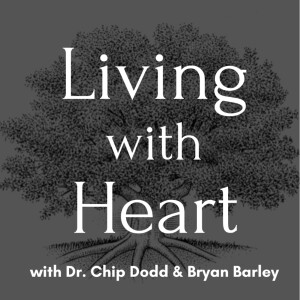
Tuesday Feb 25, 2025
56 - 12 Movements of a Man's Life #6: A Man Identifies Himself with Mercy
Click here to read the episode highlights.
The "Living with Heart" Podcast is brought to you by Chip Dodd Resources (www.chipdodd.com) and The Voice of the Heart Center (vothcenter.com). Contact Bryan Barley for coaching at bryan@vothcenter.com.
Reminder: “The Twelve Movements of a Man’s Life” are not simply steps or a list. They are movements that we live in for the rest of our lives, continuing to grow and learn as we do so. We never finish; hopefully, we grow and learn until we die.
In order for all 12 of the movements to work, it is essential that a man orders his life, as we talked about in episode #50. Man must place God first in his life and himself second. Without connection to God, he will eventually wear out and/or burn-out.
Movement #6 - A man identifies himself with mercy:
- He knows that but for the grace and mercy of God, he would not be “where he is.” He would not be able to identify himself with The Twelve Movements, and he would not be able to implement them.
- Because he identifies his own need for mercy, having received it himself, he tends to be merciful and gentle without being weak.
The need for mercy assumes that the man has known/knows feelings and needs, and that he has the humility to admit having feelings and needs. This man knows pain, and he doesn’t run from it.
Pain comes from the Greek word pathos, which means feelings.
From our willingness to feel, we develop three other important characteristics that come from pathos:
- We develop passion, which is a willingness to be in pain (have feelings) for something that matters more than the pain.
- We also develop patience, which means the capacity to wait on our hopes to be realized.
- With patience, we can delay gratification.
With passion, we can remain in pursuit of the results we seek.
People who run from pathos become pathological, which means sick. Feelings don’t harm us, but running from them does.
The great achievements of life in art, literature, science, medicine, in society in general, have their origin in passion and patience.
Love itself relates to our willingness to have pathos.
Luke 10:25-37 tells the story of The Good Samaritan, a man who identifies with mercy.
The Good Samaritan had empathy, which means he had experienced pain; therefore, he could identify with the another’s pain. Since he could relate to pain, he could have compassion for another who was in pain.
No comments yet. Be the first to say something!